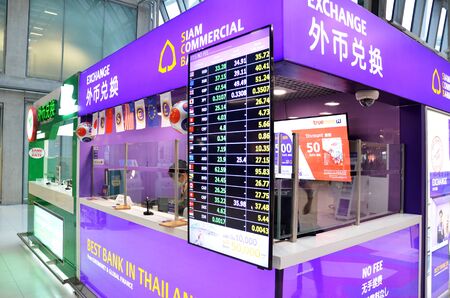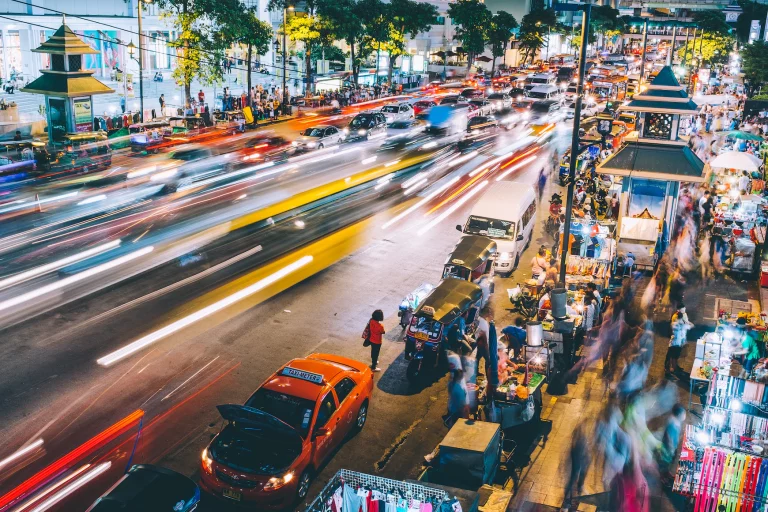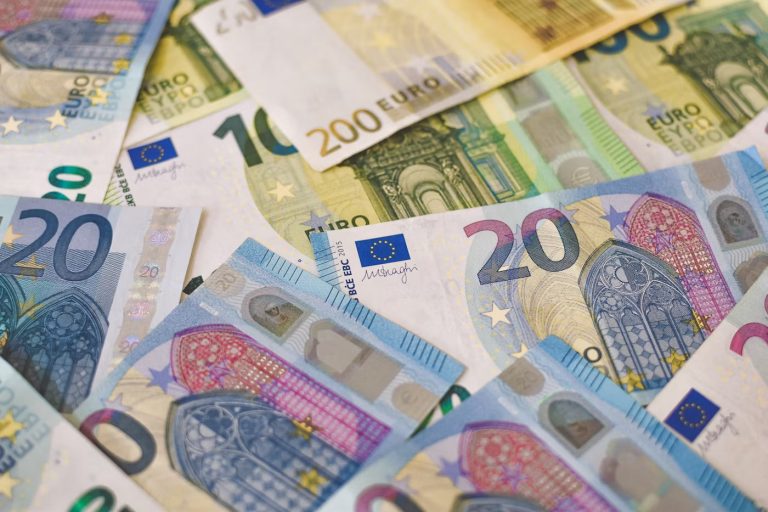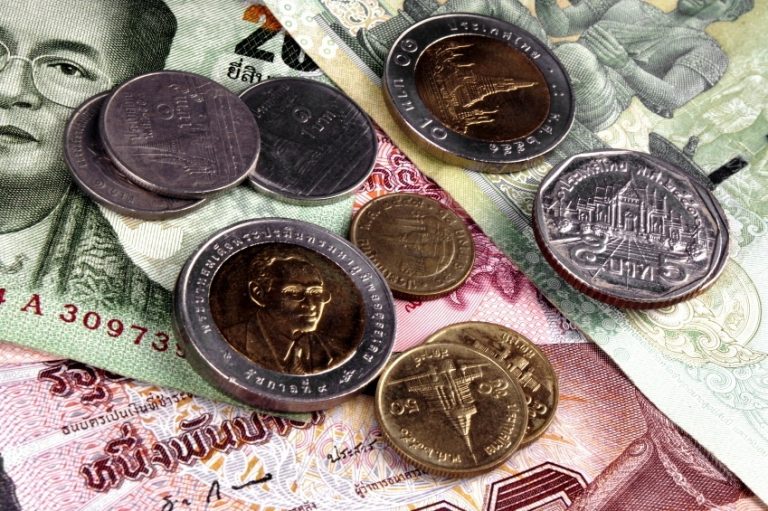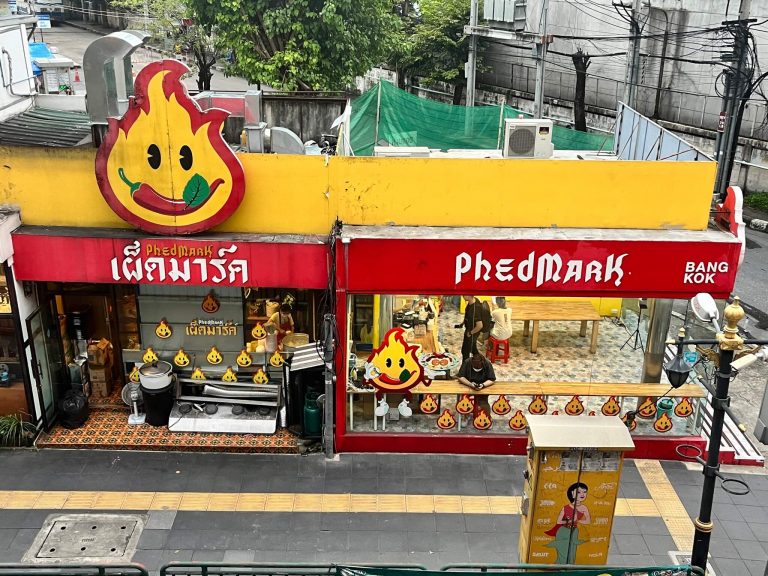Would you like to know how to get the best exchange rates in Thailand? Welcome to this updated 2025 guide on how to stretch your travel money further while avoiding unnecessary fees. With a few smart tips, you can keep more baht in your pocket and enjoy your time in the Land of Smiles without worrying about high ATM charges or poor exchange rates.
Thailand Currency Exchange Guide
Thai Money Currency is called the Baht
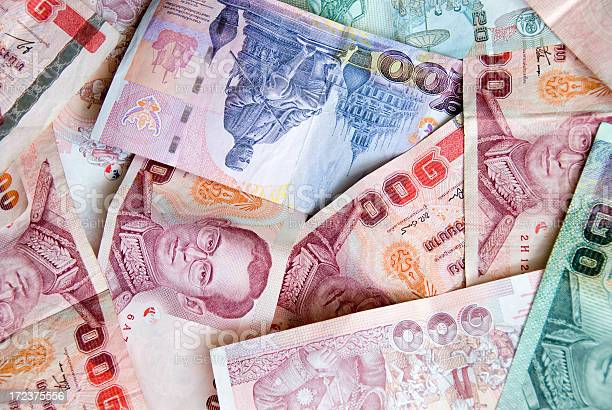
The Thai Baht (THB) is the currency of Thailand. The symbol for Thai Baht can be written as ฿. As of this writing, the Thai Baht Exchange Rate is $1 USD to ฿32 Baht. For the best money conversion rates, please refer to XE.com. Over the past decade, rates have fluctuated as low as 29 to as high as 36 in exchange for the USD.
Thai bank notes have images of the past and present Thai kings. Please respect notes and anything doing with the king, Thai people take this very seriously and you could be fined or worse if you are caught disrespecting the Royal Family. This Includes stepping on notes or coins.
Thai Baht notes come in the following denominations: 20, 50, 100, 500, 1000. Also coins called satang are used and are available in 1, 2, 5, 10, 25, 50. Coins are useful for metro tickets, used in tipping at restaurants, or leaving in your room for the housekeeping staff.
Understanding the Best Exchange Rates in Thailand
Before diving into tactics, it’s important to understand how currency exchange works in Thailand. Travelers have several options for converting money, including ATMs, local banks, independent money exchanges, and airport kiosks. Each has advantages and disadvantages when it comes to convenience, fees, and the exchange rate you receive. Knowing these choices will help you secure the best exchange rates in Thailand and avoid unnecessary costs.
1. Research Exchange Rates: Always check the live exchange rate before your trip so you know what’s fair. As of late 2025, the Thai baht trades around 32 THB per USD, though rates fluctuate daily. Tools like XE.com, Wise, or your banking app give you real-time data. This will help you spot poor offers at airports or hotels.
2. Using ATMs in Thailand: ATMs usually provide a fair rate close to the market rate, but fees are the problem. Most Thai banks charge 220 THB per withdrawal, while AEON ATMs are slightly cheaper at 150 THB. Some banks like Krungsri occasionally charge 200 THB. To reduce costs, withdraw larger amounts less often and use a debit card that reimburses ATM fees (like Charles Schwab).
3. Notify Your Bank Before Traveling: Nothing is worse than having your card blocked abroad. Inform your bank or enable travel notifications in your app to ensure smooth transactions. This also lowers the risk of fraud alerts locking your account while you’re in Thailand.
4. Prepaid Travel Cards: Consider prepaid options like the Wise travel card, which lets you hold multiple currencies and spend at near mid-market rates with low fees. These cards also help you lock in favorable exchange rates in advance, making budgeting easier.
5. Local Banks and Money Exchanges: For those who prefer cash, reputable money changers like SuperRich in Bangkok consistently offer the best rates in Thailand. City branches almost always beat airport kiosks, which are convenient but expensive. Licensed exchanges in Chiang Mai, Phuket, and Pattaya can also offer competitive rates. Always compare a few before exchanging large amounts.
Current Currency Exchange Rates for Thai Baht
Live Best Money Conversion Exchange Rates for English speaking countries.
Currency data courtesy coinmill.com
Exchanging Money Before Traveling
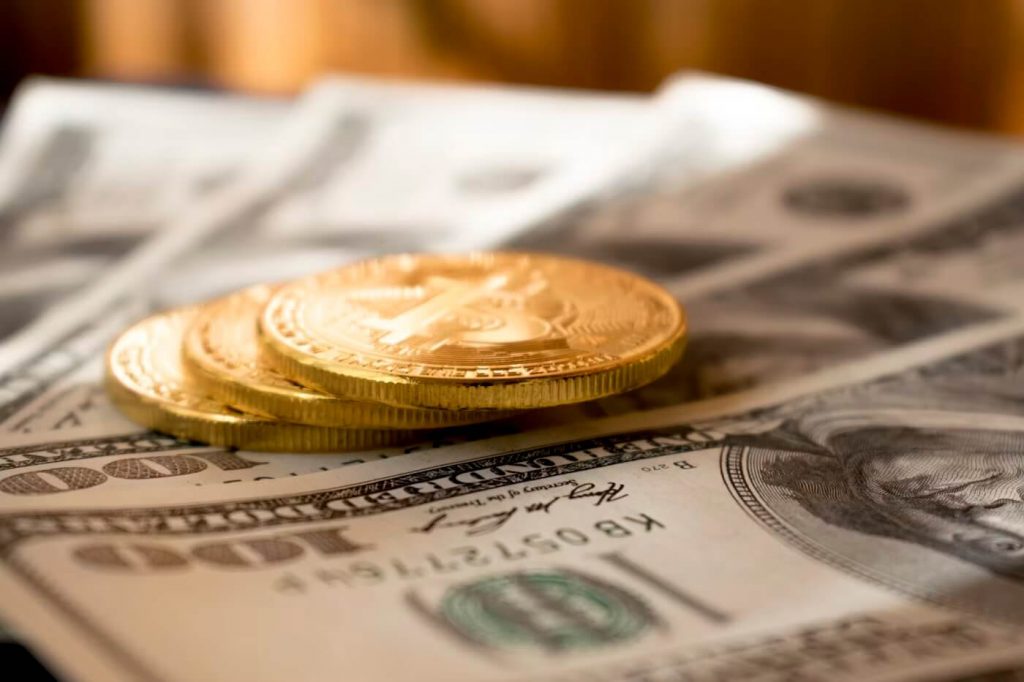
Some travelers prefer to exchange cash at their local bank before leaving home. This can give you peace of mind by arriving in Thailand with some baht in your pocket for taxis, SIM cards, or food. However, keep in mind:
- Rates at U.S. or European banks are usually less competitive than what you’ll find at money changers in Thailand.
- Many banks charge an extra service fee for ordering foreign currency.
- The main benefit is convenience and security, not savings.
👉 A smart strategy is to exchange a small amount before traveling (enough for your first couple days), and then switch to ATMs or trusted exchanges like SuperRich once you’re in Thailand.
Avoid Airport Currency Exchange Booths
Airport exchange counters may be convenient, but they’re almost always the worst place to exchange money in Thailand. These kiosks know that travelers arriving need cash quickly, and they charge for that convenience with poor exchange rates and hidden fees.
- Unfavorable Exchange Rates: Airport booths typically offer rates 5–10% worse than city exchanges. For example, while SuperRich in Bangkok might give you 37 THB per USD, the airport counter could offer only 34–35 THB. On larger amounts, that’s a big loss for just a little convenience.
- High Fees and Commissions: Some airport exchange desks add extra service fees or commissions on top of poor rates. This means you’re effectively paying twice. Even if they advertise “no commission,” the hidden cost is baked into the low rate.
- Limited Competition: In airports, you don’t have the option to shop around — kiosks often belong to the same operators and display nearly identical rates. In city centers, however, competition between exchanges drives rates much closer to the mid-market rate.
- Safety & Convenience Concerns: Carrying large amounts of cash straight out of the airport isn’t ideal. It’s much safer to withdraw a small amount from an ATM at the airport (using a fee-free card like Charles Schwab or Wise) and then exchange larger amounts later at a trusted money changer in the city.
Pro Tip for Travelers
If you absolutely need Thai baht upon arrival, withdraw a small amount at the airport ATM or exchange just enough for transport. Once you’re in the city, head to a licensed exchange service like SuperRich for the best rates in Thailand.
Avoiding Foreign Transaction Fees & ATM Charges
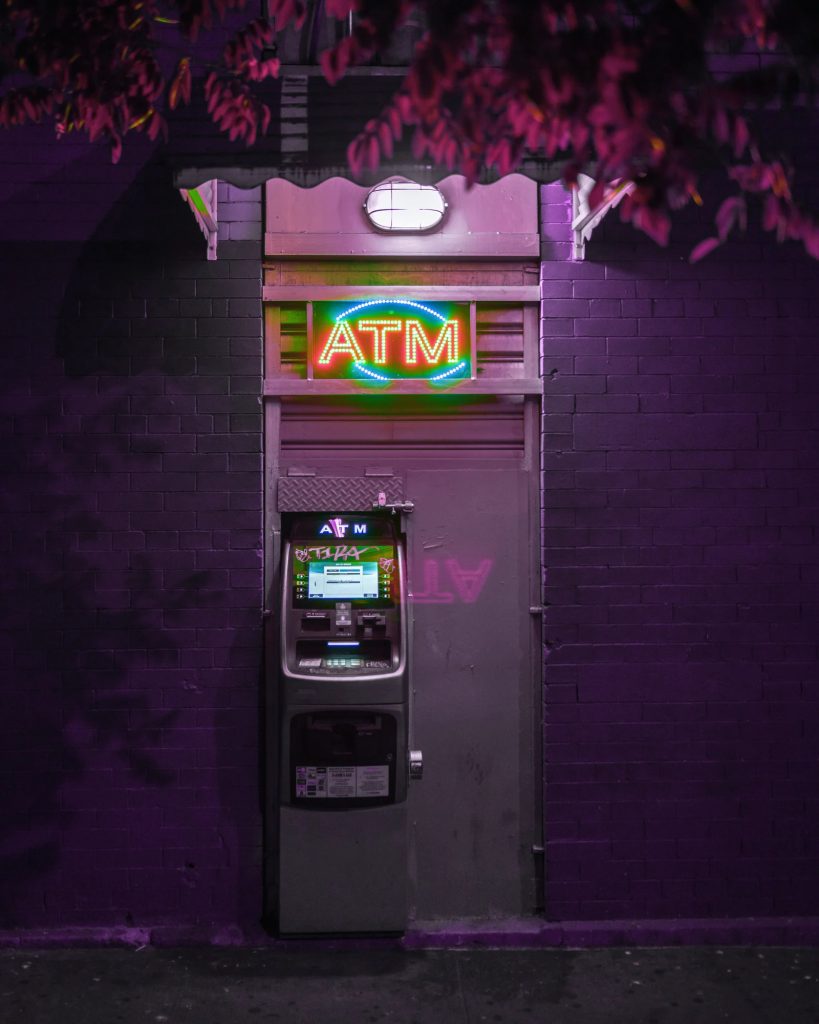
The easiest way to access cash in Thailand is to withdraw Thai baht directly from an ATM. However, almost all Thai banks now charge a 220 THB fee per withdrawal (around $6–7 USD). On top of that, your U.S. bank may also add a foreign transaction fee. Together, this can cost you $10 or more every time you withdraw cash.
The good news? With the right debit card, you can avoid most of these fees and stretch your money further.
Best Debit and Travel Cards for American Travelers
1. Charles Schwab Debit Card (Best Overall)
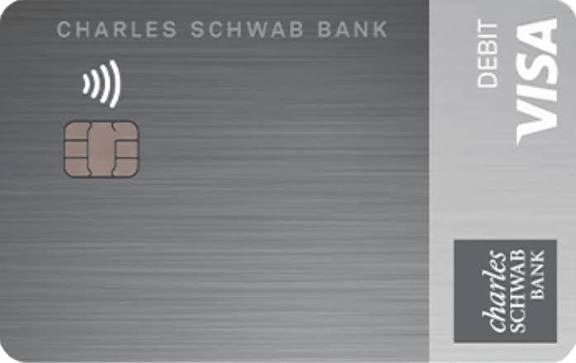
The Charles Schwab Debit Card still the #1 choice for Americans traveling in Thailand.
- Unlimited ATM fee reimbursements worldwide (Schwab refunds the 220 THB Thai bank fee at the end of each month).
- No foreign transaction fees.
- Widely accepted since it’s a Visa debit card.
This card essentially makes all Thai ATMs “free,” which is why it’s the best option for U.S. travelers.
2. Capital One 360 Debit Card

Capital One 360 is another solid choice and a strong backup..
- No foreign transaction fees.
- Works with Visa/Mastercard networks.
- Still subject to the Thai ATM fee (220 THB), but you won’t pay extra to Capital One.
- Free international withdrawals at MoneyPass® and Allpoint® ATMs (though these networks are limited in Thailand).
3. Wise Travel Card (Best Alternative for Multi-Currency Use)
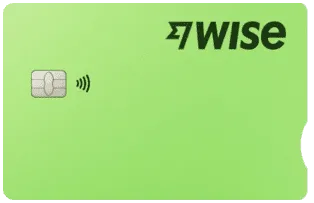
The Wise Debit Card is ideal for managing multiple currencies.
- Uses the mid-market exchange rate (very competitive).
- Low, transparent conversion fees.
- Functions as both a debit card and a multi-currency wallet.
- Accepted anywhere Visa or Mastercard is used.
Wise doesn’t refund Thai bank ATM fees like Schwab, but it’s great for budgeting and paying in shops or restaurants without cash.
Other Options Worth Considering
- Chime – No foreign transaction fees, but still subject to Thai ATM charges.
- UK travelers – Starling Bank and Monzo are popular fee-free cards.
- Caxton Travel Card – Some positive reviews, though not widely tested in Thailand.
Withdrawing Cash Inside Banks
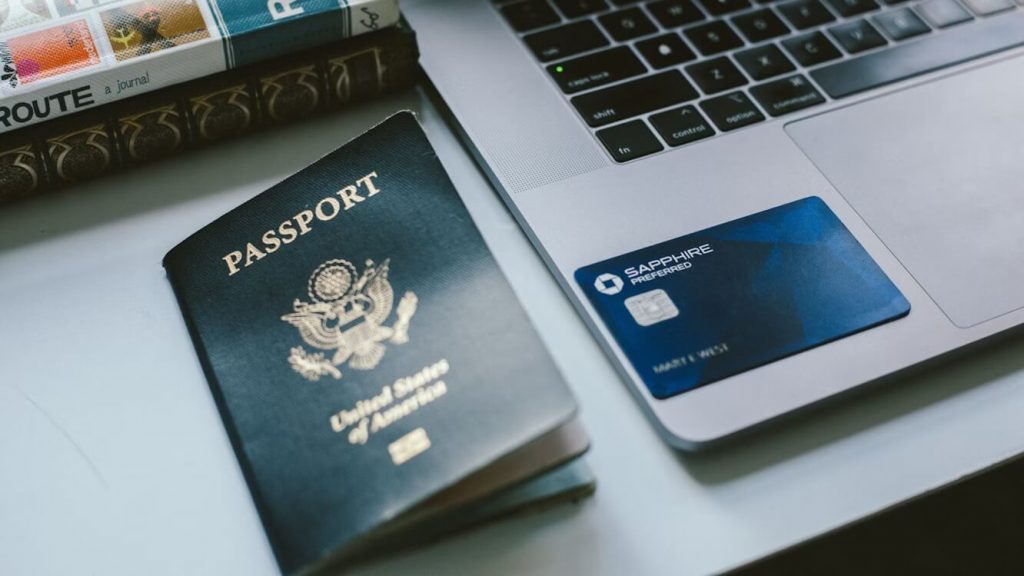
A lesser-known tip is to withdraw money inside a bank branch instead of at an ATM.
- Bring your passport and debit card to the counter.
- Some travelers report that withdrawals inside the bank avoid the 220 THB ATM fee.
- Added security since you’re inside the branch, not at a street ATM.
This method isn’t guaranteed at every bank, but it’s worth trying if you want to save on fees.
Practical ATM & Withdrawal Tips in Thailand
- Withdraw larger amounts (e.g., 10,000–20,000 THB) to reduce the impact of fixed fees.
- AEON ATMs charge a lower fee (150 THB) than other Thai banks.
- Daily ATM limits vary: most banks allow 20,000–30,000 THB per day.
- Thailand is still a cash-based society — street food, taxis, night markets, and massages all require cash.
- For hotels, restaurants, and big purchases, use a credit card with no foreign transaction fees to earn rewards and keep your cash for small expenses.
SuperRich Thailand: Best Currency Exchange
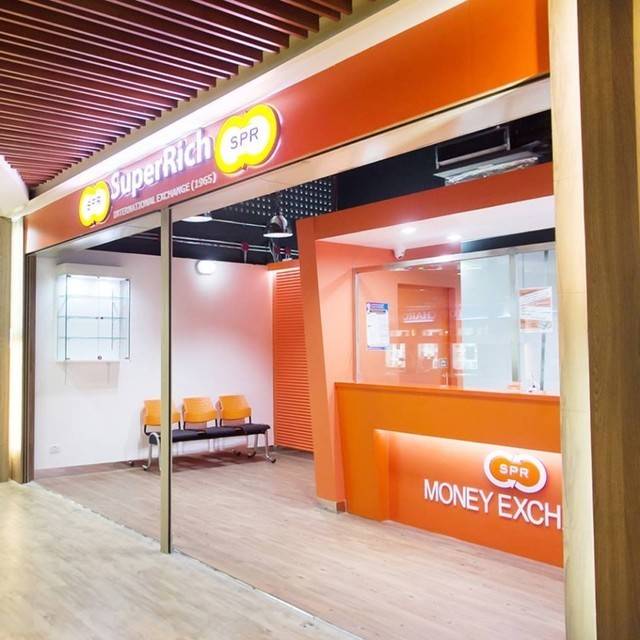
If you’re staying in Bangkok, SuperRich Thailand is hands down the most trusted place for getting the best exchange rates in Thailand. This privately owned exchange company has been around for decades and operates multiple branches throughout the city.
Where to Find SuperRich – The most convenient locations include:
- Suvarnabhumi Airport (BKK) – Basement Floor (B), near the Airport Rail Link into the city.
- Asoke BTS Station – A central branch that’s easy to access from Sukhumvit.
- Other branches across Bangkok, plus limited locations in major cities.
Green vs. Orange SuperRich – You’ll notice both logos in Bangkok (green or orange). They are separate companies, but their rates are usually almost identical.
- ✅ Consistently among the best exchange rates in Thailand
- ✅ No extra fees or commissions
- ✅ Trusted by both locals and travelers
- ✅ Fast, safe, and reliable service
💡 Pro tip: There’s now a new kiosk next to SuperRich in Bangkok’s Suvarnabhumi Airport that sometimes offers slightly better rates—worth checking before you exchange.
👉 For today’s rates, visit the official SuperRich Thailand website.
Using Credit Cards in Thailand: What You Need to Know
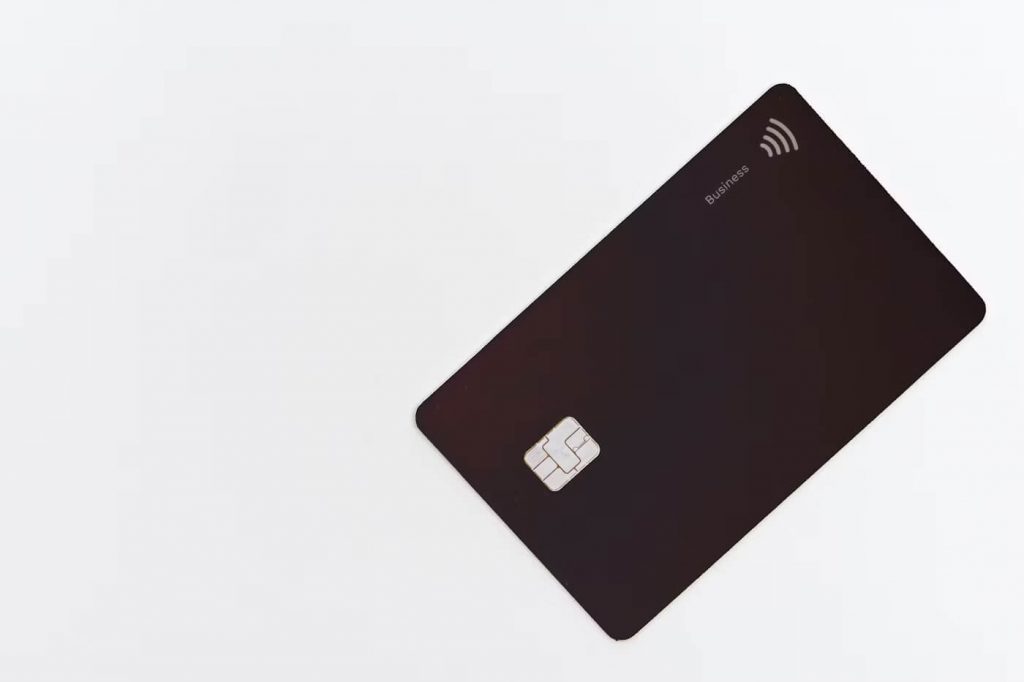
While Thailand is still a cash-first society, credit cards are accepted in hotels, shopping malls, 7-Eleven, restaurants, and larger tourist businesses. However, there are important things to keep in mind:
- Best Travel Credit Cards – If you’re American, using a credit card with no foreign transaction fees can help you save money and earn travel rewards. Check out my guide on the Best Travel Credit Cards for International Travel for recommendations.
- Fraud & Skimming Risks – Credit card fraud is unfortunately common in Thailand. I personally had my card compromised twice after handing it over for payment. Skimming devices and dishonest staff can steal your information.
Safer Payment Options
- ✅ Use Apple Pay or Google Wallet whenever possible (widely accepted in Bangkok, Chiang Mai, Phuket, and other tourist areas).
- ✅ If you must use your card, never let it out of your sight.
- ✅ Avoid swiping or inserting your card manually; use tap-to-pay when available.
- ✅ Always travel with two backup cards, just in case.
👉 For day-to-day purchases like street food, taxis, massages, and night markets, cash is still king. Use credit cards mainly for secure, higher-value transactions.
Conclusion: Best Strategy for Money Exchange
The best way to get the most value in Thailand is to avoid airport exchange counters, withdraw cash smartly with fee-free cards like Charles Schwab, Capital One 360, or Wise, and use trusted providers such as SuperRich Thailand for top exchange rates in Bangkok. Always carry cash for everyday purchases, rely on Apple Pay or Google Wallet instead of handing over your physical card to reduce fraud risk, and if you prefer extra security, consider exchanging a small amount of Thai Baht at your local bank before traveling.
If you liked this article, please view my full Thailand Travel Guide.
.
Is it better to exchange money at the airport or in the city?
Exchanging money at the airport may be convenient, but rates can be less favorable. It’s often better to exchange money in the city at reputable exchange offices or banks for the Best Exchange Rates in Thailand.
Should I use cash or credit cards in Thailand?
It’s best to have a mix of both. Credit cards are widely accepted in cities and major establishments, but having cash is useful for smaller businesses and local markets.
Can I exchange leftover Thai baht back to my home currency before leaving Thailand?
Yes, many banks and currency exchange offices allow you to convert your leftover Thai baht back to your home currency. Keep your exchange receipts for easy transactions.
What are the common scams to watch out for when exchanging money in Thailand?
Be cautious of unauthorized money exchange services, as they may offer unfavorable rates or engage in scams. Stick to reputable banks and exchange offices.

